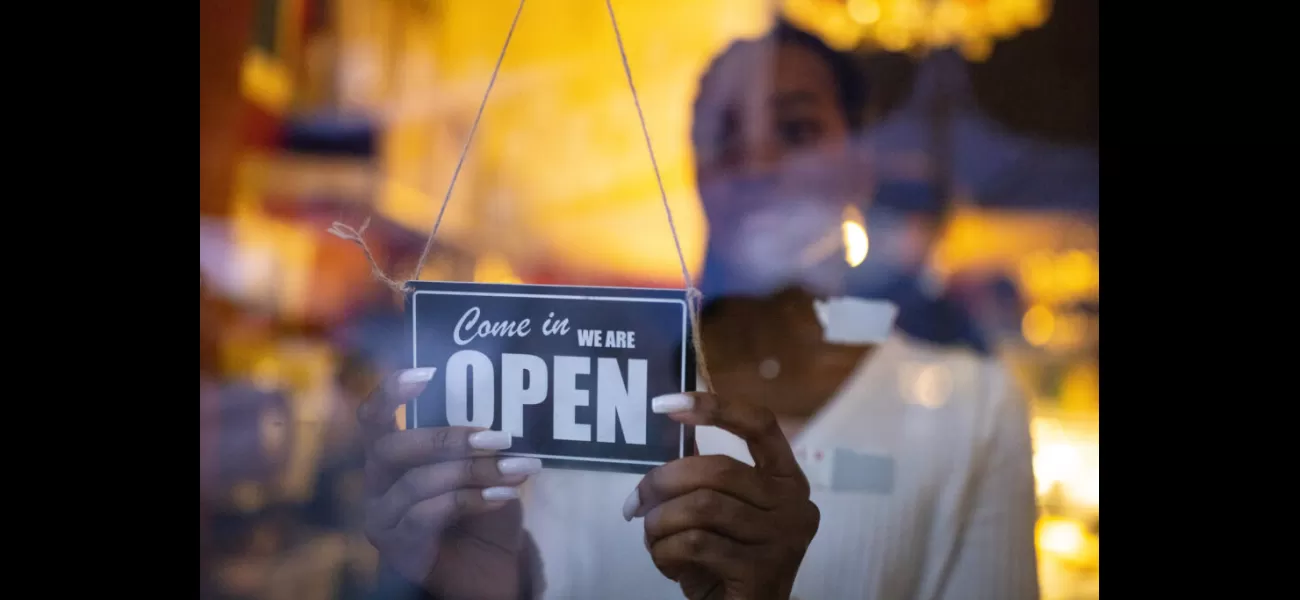A detailed examination of the intricacies of securing startup funding.
African American entrepreneurs have various choices for obtaining startup loans, including SBA programs and bank loans. Choose the right one for your business.
June 28th 2024.

When it comes to being an entrepreneur, securing funding for your startup can feel like a daunting task. Whether you're seeking a traditional bank loan or trying your luck with crowdfunding on platforms like Kickstarter, financing is a crucial step in turning your business idea into a reality. Fortunately, there are numerous options available for financing your business, including specific loan programs designed for African American and other minority entrepreneurs to cater to their unique needs.
If you're new to the world of startup business loans, you may be wondering what exactly they are and how to go about applying for one. Essentially, a startup business loan is a type of financing offered by lenders that follow the guidelines set by the Small Business Administration (SBA). While loans can also be obtained outside of the SBA, their loan programs aim to connect entrepreneurs with lenders who are willing to take on the risk of funding new businesses with limited financial history.
To find lenders partnered with SBA loan programs, you can use the SBA's Lender Match referral tool. Simply answer a few survey questions, and within a few days, you'll receive an email from interested lenders. From there, you can contact them to discuss financing options for your business. Before submitting your loan application, it's important to have a clear understanding of the rates and terms involved, so be sure to have those discussions with your potential lenders beforehand.
Now, you may be wondering if you even qualify for a small business loan. The good news is that the eligibility requirements are not as strict as you might think. Your business must be for-profit, operate in the United States, and you must be able to prove that you have invested your own time and money into the company. Additionally, you must show that you have not been able to secure loans from other lenders. Being able to provide this information will make the application process much smoother.
When it comes to the actual application, you will need to gather various documents and information for the lender, including a business plan, requested loan amount, credit history, financial projections, collateral, and industry experience. These are all important factors in the lender's decision-making process, as they want to ensure that you have a solid plan in place to pay back the loan.
As for the types of SBA loan programs available, they vary depending on the amount of money needed and the purpose of the loan. Some options include general small business loans, microloans, real estate loans, and disaster loans. Microloans, in particular, can be a great option for very small businesses, as they are often more willing to provide funding to women of color and other minorities.
Speaking of minority entrepreneurs, it's worth mentioning that there are resources and loan programs specifically designed for African American and other underserved communities. SBA Community Advantage loans and 8 loans are two examples of programs that make funding more accessible to these communities. These loans are typically provided by certified community lenders and can range from $20,000 to $250,000. Eligibility requirements may vary, but in general, the applicant must have a strong business plan and be able to demonstrate a need for the loan.
In conclusion, securing funding for your startup may seem like a daunting task, but with the various loan options available, it can be a manageable and rewarding process. By following the steps outlined in this guide and doing your research, you can find the right financing option for your business and take the first step towards making your entrepreneurial dreams a reality.
When it comes to starting a business, one of the biggest challenges is securing the necessary funds. Whether you're seeking a traditional bank loan or utilizing crowdfunding on platforms like Kickstarter, financing is a crucial aspect of being an entrepreneur. Fortunately, there are various options available for financing your business, including startup business loans. Additionally, there are specific financing and loan options that cater to the needs of communities such as African Americans and other minorities.
So, what exactly is a startup business loan? It is a type of financing offered by lenders who follow the guidelines set by the Small Business Administration (SBA) for new or expanding businesses. While loans can also be obtained outside of the SBA, their loan programs are designed to match entrepreneurs with lenders who are willing to take on the greater risk associated with businesses that have little financial history. To find lenders partnered with SBA loan programs, you can use their helpful Lender Match referral tool. Simply answer a few questions, and you'll be connected with potential lenders in just a few days. From there, you can discuss financing options and rates with the lenders before submitting your application.
Now, you may be wondering if you qualify for a small business loan. The good news is that the qualifications are not as difficult as one might think. To be eligible for a startup business loan, your business must be for-profit and operate in the United States. Additionally, you must be able to prove that you have invested your own time and money into the company and have not been able to secure loans from other lenders. Being able to provide this information will make it much easier to apply for a small business loan.
When you're ready to apply for a business loan, you'll need to gather all the necessary documents required by the lender. These may include a business plan, details on the requested loan amount and how it will be used, your credit history, financial projections for the next five years, collateral, and your industry experience. These documents will help the lender assess the risk and determine if you are a suitable candidate for a loan.
There are different types of SBA loan programs available, depending on the amount of money you need and how it will be used. For example, the General Small Business Loans, also known as 7 loans, can be used for various purposes such as starting a business, purchasing equipment, and refinancing debt. The SBA Microloan program offers loans between $5,000 and $50,000 to small businesses and non-profit childcare centers. Additionally, there are Real Estate Loans and Disaster Loans available for businesses of all sizes.
For very small companies, microloans can be a great option, especially since they are more accessible to women of color and other minorities. The SBA also offers loans specifically for businesses in underserved communities through their Community Advantage and 8 loan programs. These loans are granted by certified community lenders and typically range from $20,000 to $250,000. Whether you're a minority or not, these loans aim to provide funding to small businesses that lack the resources to start and grow.
Starting a business can be a daunting task, but with the right resources and funding, it is possible to turn your entrepreneurial dreams into a reality. With the various financing options available, including startup business loans and loan programs geared towards minorities, you can take your first steps towards building a successful business.
If you're new to the world of startup business loans, you may be wondering what exactly they are and how to go about applying for one. Essentially, a startup business loan is a type of financing offered by lenders that follow the guidelines set by the Small Business Administration (SBA). While loans can also be obtained outside of the SBA, their loan programs aim to connect entrepreneurs with lenders who are willing to take on the risk of funding new businesses with limited financial history.
To find lenders partnered with SBA loan programs, you can use the SBA's Lender Match referral tool. Simply answer a few survey questions, and within a few days, you'll receive an email from interested lenders. From there, you can contact them to discuss financing options for your business. Before submitting your loan application, it's important to have a clear understanding of the rates and terms involved, so be sure to have those discussions with your potential lenders beforehand.
Now, you may be wondering if you even qualify for a small business loan. The good news is that the eligibility requirements are not as strict as you might think. Your business must be for-profit, operate in the United States, and you must be able to prove that you have invested your own time and money into the company. Additionally, you must show that you have not been able to secure loans from other lenders. Being able to provide this information will make the application process much smoother.
When it comes to the actual application, you will need to gather various documents and information for the lender, including a business plan, requested loan amount, credit history, financial projections, collateral, and industry experience. These are all important factors in the lender's decision-making process, as they want to ensure that you have a solid plan in place to pay back the loan.
As for the types of SBA loan programs available, they vary depending on the amount of money needed and the purpose of the loan. Some options include general small business loans, microloans, real estate loans, and disaster loans. Microloans, in particular, can be a great option for very small businesses, as they are often more willing to provide funding to women of color and other minorities.
Speaking of minority entrepreneurs, it's worth mentioning that there are resources and loan programs specifically designed for African American and other underserved communities. SBA Community Advantage loans and 8 loans are two examples of programs that make funding more accessible to these communities. These loans are typically provided by certified community lenders and can range from $20,000 to $250,000. Eligibility requirements may vary, but in general, the applicant must have a strong business plan and be able to demonstrate a need for the loan.
In conclusion, securing funding for your startup may seem like a daunting task, but with the various loan options available, it can be a manageable and rewarding process. By following the steps outlined in this guide and doing your research, you can find the right financing option for your business and take the first step towards making your entrepreneurial dreams a reality.
When it comes to starting a business, one of the biggest challenges is securing the necessary funds. Whether you're seeking a traditional bank loan or utilizing crowdfunding on platforms like Kickstarter, financing is a crucial aspect of being an entrepreneur. Fortunately, there are various options available for financing your business, including startup business loans. Additionally, there are specific financing and loan options that cater to the needs of communities such as African Americans and other minorities.
So, what exactly is a startup business loan? It is a type of financing offered by lenders who follow the guidelines set by the Small Business Administration (SBA) for new or expanding businesses. While loans can also be obtained outside of the SBA, their loan programs are designed to match entrepreneurs with lenders who are willing to take on the greater risk associated with businesses that have little financial history. To find lenders partnered with SBA loan programs, you can use their helpful Lender Match referral tool. Simply answer a few questions, and you'll be connected with potential lenders in just a few days. From there, you can discuss financing options and rates with the lenders before submitting your application.
Now, you may be wondering if you qualify for a small business loan. The good news is that the qualifications are not as difficult as one might think. To be eligible for a startup business loan, your business must be for-profit and operate in the United States. Additionally, you must be able to prove that you have invested your own time and money into the company and have not been able to secure loans from other lenders. Being able to provide this information will make it much easier to apply for a small business loan.
When you're ready to apply for a business loan, you'll need to gather all the necessary documents required by the lender. These may include a business plan, details on the requested loan amount and how it will be used, your credit history, financial projections for the next five years, collateral, and your industry experience. These documents will help the lender assess the risk and determine if you are a suitable candidate for a loan.
There are different types of SBA loan programs available, depending on the amount of money you need and how it will be used. For example, the General Small Business Loans, also known as 7 loans, can be used for various purposes such as starting a business, purchasing equipment, and refinancing debt. The SBA Microloan program offers loans between $5,000 and $50,000 to small businesses and non-profit childcare centers. Additionally, there are Real Estate Loans and Disaster Loans available for businesses of all sizes.
For very small companies, microloans can be a great option, especially since they are more accessible to women of color and other minorities. The SBA also offers loans specifically for businesses in underserved communities through their Community Advantage and 8 loan programs. These loans are granted by certified community lenders and typically range from $20,000 to $250,000. Whether you're a minority or not, these loans aim to provide funding to small businesses that lack the resources to start and grow.
Starting a business can be a daunting task, but with the right resources and funding, it is possible to turn your entrepreneurial dreams into a reality. With the various financing options available, including startup business loans and loan programs geared towards minorities, you can take your first steps towards building a successful business.
[This article has been trending online recently and has been generated with AI. Your feed is customized.]
[Generative AI is experimental.]
0
0
Submit Comment





